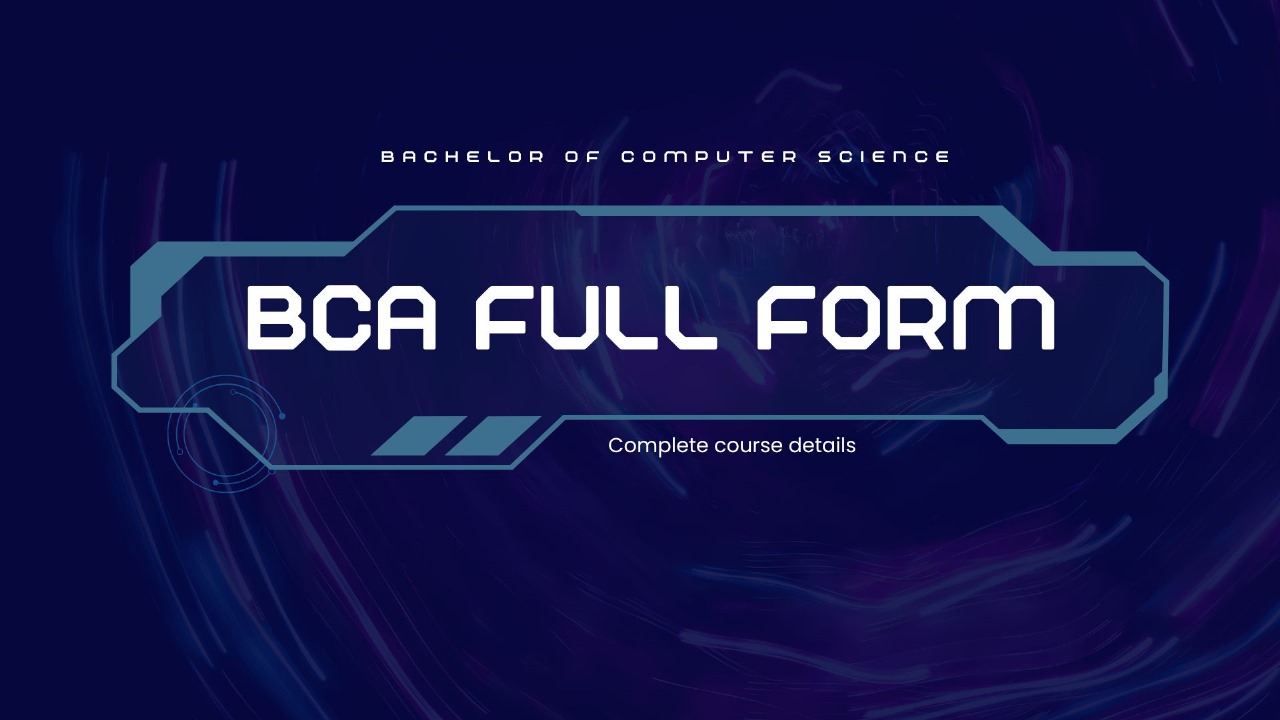BCA Full Form: Bachelor of Computer Applications Explained

Strong 8k brings an ultra-HD IPTV experience to your living room and your pocket.
The BCA full form stands for Bachelor of Computer Applications. It is one of the most popular undergraduate degree programs for students who want to pursue a career in computer science, information technology, and software development. The program provides in-depth knowledge about computer systems, programming languages, database management, and application development, preparing students to meet the demands of the rapidly growing IT sector.
This article will explain the BCA degree, its eligibility, course structure, subjects, career opportunities, and the skills you can gain from this program.
What is BCA?
The Bachelor of Computer Applications (BCA) is a three-year undergraduate program designed for students who wish to enter the field of computer science and information technology. It serves as an excellent alternative to the traditional Bachelor of Technology (B.Tech) in Computer Science, focusing more on software development, programming, and computer applications.
The course curriculum is designed to equip students with both theoretical knowledge and practical skills to solve real-world technological problems. By the end of the program, graduates are capable of developing applications, managing software, handling databases, and working with emerging technologies.
Eligibility Criteria for BCA
To pursue a BCA degree, candidates must meet specific eligibility requirements. While criteria may vary slightly depending on the university or college, the general requirements include:
Educational Qualification: Students must have completed their 10+2 education (or equivalent) from a recognized board.
Minimum Marks: A minimum of 50-60% marks in Class 12 is usually required. Some institutions may have a lower cutoff for admission.
Subjects in Class 12: While students from any stream (Science, Commerce, or Arts) can apply for BCA, having Mathematics or Computer Science as a subject in Class 12 is often preferred.
Entrance Exams: Certain universities conduct entrance exams for admission, while others accept students based on merit.
Course Duration and Structure
The BCA program is generally a 3-year undergraduate degree divided into 6 semesters. Each semester focuses on different subjects, providing theoretical knowledge, practical experience, and project-based learning.
The course curriculum typically includes:
Core Subjects: Programming languages, database management, networking, and software development.
Electives: Advanced topics such as artificial intelligence, machine learning, and data analytics.
Practical Training: Projects, internships, and laboratory sessions help students gain real-world exposure.
Subjects Covered in BCA
The BCA syllabus is designed to develop a deep understanding of computer systems, programming, and applications. Some of the major subjects taught in BCA include:
Programming Languages:
C, C++, Java, Python, and PHP.
Emphasis is placed on coding, algorithms, and problem-solving techniques.
Database Management Systems (DBMS):
Understanding databases, SQL, and database tools for data management.
Web Development:
HTML, CSS, JavaScript, and frameworks like React or Angular for front-end development.
Operating Systems:
Basics of operating systems like Windows, Linux, and UNIX.
Data Structures and Algorithms:
Learning how to organize and store data efficiently.
Computer Networking:
Introduction to computer networks, networking protocols, and internet technologies.
Software Engineering:
Understanding software development life cycles, project management, and testing.
Mathematics:
Basic mathematics concepts such as statistics, calculus, and discrete mathematics.
Emerging Technologies:
Fundamentals of cloud computing, cybersecurity, artificial intelligence, and big data.
Projects and Internships:
Hands-on projects and internships allow students to apply theoretical knowledge to practical problems.
Skills Developed During the BCA Program
Pursuing a BCA degree helps students develop several technical and professional skills essential for success in the IT industry. These include:
Programming Skills: Writing clean and efficient code using programming languages like Java, Python, and C++.
Problem-Solving Skills: Developing logical thinking and analytical skills to address technological challenges.
Software Development: Designing, testing, and maintaining applications and software systems.
Database Management: Managing large datasets and understanding database systems.
Web Development: Building websites and web applications using modern technologies.
Networking Skills: Understanding how to set up and maintain computer networks.
Teamwork and Communication: Working in groups and presenting projects effectively.
Adaptability: Staying updated with emerging technologies like AI, cloud computing, and IoT.
Career Opportunities After BCA
The BCA degree opens up a wide range of career opportunities in the IT and software development sectors. Graduates can secure jobs in private companies, government organizations, startups, and multinational corporations. Here are some popular job roles for BCA graduates:
Software Developer:
Designing, coding, and testing software applications for various industries.
Web Developer:
Developing and maintaining websites and web applications using front-end and back-end technologies.
IT Support Specialist:
Managing and troubleshooting IT systems, hardware, and software issues.
Database Administrator:
Ensuring the smooth functioning of database systems and managing large amounts of data.
Network Administrator:
Setting up and managing computer networks for organizations.
Mobile App Developer:
Creating applications for Android and iOS platforms.
Data Analyst:
Using data to generate insights for businesses and decision-making.
System Analyst:
Analyzing and improving IT systems for better efficiency.
Cybersecurity Specialist:
Ensuring the safety of data and systems from cyber threats.
Cloud Computing Specialist:
Working with cloud platforms like AWS, Microsoft Azure, and Google Cloud.
Higher Education Options After BCA
Many students choose to pursue higher education after completing their BCA degree to enhance their skills and career prospects. Some of the popular options include:
MCA (Master of Computer Applications):
A two-year postgraduate program that provides advanced knowledge in computer applications and software development.
MBA (Master of Business Administration):
For students interested in management roles within IT or other industries.
MSc IT (Master of Science in Information Technology):
A postgraduate program that focuses on IT and its applications.
Certification Courses:
Specialized certifications in areas like Data Science, Artificial Intelligence, Cybersecurity, and Cloud Computing can boost career opportunities.
PG Diploma Programs:
Short-term postgraduate programs in computer science and IT-related fields.
Why Choose BCA?
Here are some reasons why students choose to pursue a BCA degree:
Growing IT Industry:
The demand for skilled IT professionals is constantly increasing worldwide.
High Career Scope:
BCA offers diverse job roles in IT, software, and related industries.
Practical Learning:
The course combines theory with hands-on learning through projects, programming, and internships.
Short Duration:
Compared to other technical programs, BCA is a three-year course.
Pathway to Higher Education:
Graduates can pursue advanced degrees like MCA or MBA to boost their careers.
Affordable Education:
Compared to B.Tech programs, the BCA course is often more budget-friendly.
Conclusion
The BCA full form, or Bachelor of Computer Applications, is a highly valuable undergraduate degree for students who wish to build a strong foundation in computer science and IT. Over three years, students learn programming languages, software development, database management, and networking, equipping them with skills to thrive in the dynamic IT industry.
BCA full form graduates can explore a variety of career paths as software developers, web developers, IT analysts, and more, or pursue higher education like MCA, MBA, or specialized certifications to advance their careers further. With the ever-growing demand for IT professionals, a BCA degree serves as a gateway to a promising future in technology and innovation.
Note: IndiBlogHub features both user-submitted and editorial content. We do not verify third-party contributions. Read our Disclaimer and Privacy Policyfor details.


